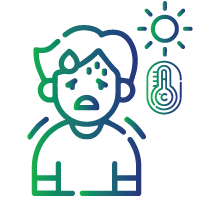
TSH Receptor Antibody Test
TSH Receptor Antibody Test
The TSH Receptor Antibody (TRAb) Test is a blood test used to detect autoantibodies against the thyroid-stimulating hormone (TSH) receptor. These antibodies play a crucial role in autoimmune thyroid disorders, particularly Graves’ disease, where they overstimulate the thyroid gland, leading to hyperthyroidism.
Graves’ disease is the most common cause of hyperthyroidism and is an autoimmune disorder where the immune system mistakenly attacks the thyroid gland. This leads to excessive thyroid hormone production, causing symptoms such as unexplained weight loss, rapid heartbeat, excessive sweating, nervousness, and bulging eyes (Graves’ orbitopathy). If left untreated, Graves’ disease can result in serious complications, including thyroid storm (a life-threatening condition), osteoporosis, and heart-related issues. The disorder is more common in women and can be triggered by factors such as stress, genetic predisposition, pregnancy, or other autoimmune conditions.
The test helps diagnose and monitor Graves’ disease, differentiate it from other thyroid disorders, and assess the risk of neonatal hyperthyroidism in pregnant women with Graves’ disease. Detecting these antibodies early allows for timely treatment planning and management.
What is the TSH Receptor Antibody Test Used For?
- Diagnosing Graves’ disease, a leading cause of hyperthyroidism.
- Differentiating Graves’ disease from other thyroid disorders, such as toxic nodular goiter.
- Assessing the risk of neonatal hyperthyroidism in babies born to mothers with Graves’ disease.
- Monitoring response to Graves’ disease treatment and predicting the risk of relapse.
Symptoms of Grave’s Disease
Graves' disease symptoms include

Enlarged thyroid (goiter)

Unintentional weight loss

Rapid or irregular heartbeat (palpitations)

Increased sweating and heat intolerance

Nervousness, anxiety, or irritability

Tremors (shaky hands)

Bulging eyes (Graves' ophthalmopathy)

Fatigue and muscle weakness

Sleep disturbances
Who Should Take the Test?
- Individuals with symptoms of hyperthyroidism, such as weight loss, rapid heartbeat, and heat intolerance.
- Patients with goiter or thyroid eye disease (Graves’ orbitopathy).
- Pregnant women with a history of Graves’ disease to assess fetal risk.
Individuals undergoing treatment for Graves’ disease to monitor disease progression.
Preparation for the Test
No fasting required. Inform your doctor about any medications, including antithyroid drugs or steroids, as they may affect results. A blood sample is drawn from a vein and sent for laboratory analysis.
Interpretation of Test Results
Positive TRAb- Suggests Graves’ disease or an increased risk of neonatal hyperthyroidism.
Negative TRAb- Low likelihood of Graves’ disease; further testing may be needed for other thyroid disorders.
Borderline or Equivocal- Requires additional evaluation with thyroid function tests (TFTs) and clinical assessment.
FAQs
How does the TRAb test differ from TPO and TG antibody tests?
TRAb is specific for Graves’ disease, whereas thyroid peroxidase (TPO) and thyroglobulin (TG) antibodies are associated with Hashimoto’s thyroiditis and other autoimmune thyroid disorders.
Can TRAb levels predict Graves’ disease relapse?
Yes, persistently high TRAb levels after treatment indicate a higher risk of relapse.
How long does it take to receive test results?
Results are typically available within 3 to 7 days, depending on the laboratory.
What if my TRAb levels are high during pregnancy?
High TRAb levels in pregnancy may indicate a risk of neonatal hyperthyroidism, requiring fetal and newborn monitoring.
What follow-up tests are recommended if TRAb is positive?
Thyroid function tests (TSH, Free T4, Free T3), thyroid ultrasound, and radioactive iodine uptake (RAIU) scan may be recommended for further evaluation.

